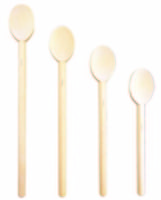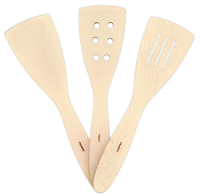Olivewood & Beechwood Utensils
Italian Olivewood & French Beechwood Cooking Utensils
Introducing our stunning line of wood cooking utensils crafted from the finest Italian olivewood and French beechwood. These beautiful and durable wood cooking utensils are the perfect addition to any kitchen, adding a touch of elegance to your cooking routine.
Each wooden cooking utensil is crafted by skilled artisans, ensuring a unique and high-quality product. The Italian olivewood is known for its distinctive and intricate grain patterns, making each wooden utensil a work of art. The French beechwood, on the other hand, is known for its strength and durability, making these wooden utensils long-lasting and reliable.
Our wooden cooking utensils come in a variety of shapes and sizes, including spoons and spatulas, and turners, ensuring that every cooking need is met. Whether you are stirring, flipping, or serving, these wooden utensils are designed to withstand the heat of the kitchen and provide you with a comfortable and firm grip.
Not only are these wooden cooking utensils aesthetically pleasing, but they are also practical. The olivewood and beechwood are naturally non-porous, making them resistant to stains and odors. This makes cleaning and maintenance a breeze, making your cooking experience even more enjoyable.
The beautiful combination of the warm tones of the olivewood and the light hues of the beechwood make these wooden utensils suitable for any kitchen decor. They are also lightweight, making them easy to handle and store.
Upgrade your cooking game with our Italian olivewood and French beechwood cooking utensils, and experience the perfect blend of beauty, functionality, and quality. Whether you are a professional or home cook, these wood cooking utensils will elevate your cooking experience and bring a touch of sophistication to your kitchen.
Why use wood spoons versus plastic or metal?
Wood utensils have been preferred by chefs around the world for centuries. Here are the most important reasons:
- Wood won’t change the taste of acidic foods like tomato sauce the way metal utensils can.
- If you're making candy or something sensitive to sudden temperature changes, you're not going to cause unexpected crystallization by putting in a tool that will suck heat out of part of your dish
- You can leave wooden spoons in the pot and they won’t melt or get too hot to handle.
- Wooden spoons go from cast-iron to non-stick to stainless pans without fear of scratching
- Wooden utensils can stir thick things without breaking, and can scrape off of the bottom of pans.
- It's wood! This means that the utensils look nice in the kitchen and feel nice in the hand. For those who went through classical training or cooked with Mom, there's a good chance that they learned to cook with wooden spoons, so there's familiarity and a bit of nostalgia.
Are your woods ecologically sourced?
All woods from France and Italy are harvested under very strict French Government rules and regulations about proper foresting practices. Both woods are sustainable.
How do I care for my wooden spoon or cutting board?
Easy! Hand-wash with warm soapy water and air dry. A wood tool will “season” itself while cooking with various oils. Some wooden tool aficionados like to season or cure their wooden spoons periodically using a non-toxic mineral oil. Do not use vegetable based oils to season a wooden tool because it can go rancid.
Do my wooden cooking spoons need to be oiled?
If your wooden spoon or cutting board start to look dry or fuzzy, periodically rub them with mineral oil, butcher block oil (such as Goddard’s) or a beeswax compound. Don't use food-based oil like vegetable or olive oil, since these can go rancid.
- Stains or roughness can be rubbed away with a piece of fine sandpaper
- Our olivewood is treated with a food safe lacquered finish. Beechwood is not treated and it’s up to the user to decide if and how they are seasoned.
Are wooden tools or cutting boards safe? Isn’t wood prone to bacteria growth? Why are wooden tools such a great sanitary choice as compared to plastics?
Wood is one of the oldest materials used to make kitchen tools, and for good reason. Wood is naturally more antibacterial than any man-made object. Trees naturally fight infection, bacteria and mold. Even though it's no longer a living organism, the properties of wood are still resistant to the growth of mold or bacteria.
Does Beechwood or Olivewood stain or pick up odors?
French beech is a clean blond wood and will season itself as used in various cooking situations. Beechwood will tend to take on food color but it’s absolutely normal. Olivewood is extremely hard and will resist staining. If washed properly, any odors from mixing or cooking should disappear.


